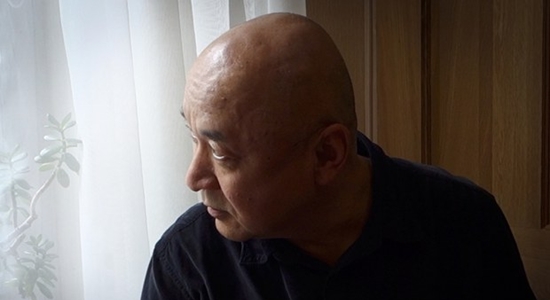
Forced harvesting of organs from persons dead or alive has become notorious as research done by private groups sparks government hearings, reports, and press conferences.
In March 2024, speaking for the Congressional-Executive Commission on China, Congressman Chris Smith said that “forced organ harvesting on an industrial scale in China is an atrocity unmatched in its wickedness. The numbers of those executed for their organs—some even before they are brain-dead—is staggering.”
Still alive
In 2019, Enver Tohti, a Uyghur surgeon, testified to the independent China Tribunal in the UK that Chinese police had compelled him to remove a man’s organs. “What I recall is with my scalpel, I tried to cut into his skin, there was blood to be seen. That indicates that the heart was still beating…. At the same time, he was trying to resist my insertion, but he was too weak.” Tohti (shown above) is still testifying.
The China Tribunal’s report said that victims were “cut open while still alive for their kidneys, livers, hearts, lungs, cornea and skin to be removed and turned into commodities for sale.”
In April 2022, American Journal of Transplantation published research finding “that brain death had not been declared in many organ retrievals in China, and that retrieval of the donor’s vital organs was the actual cause of death.”
It appears that prisoners are “killed ‘to order,’ ” based on demand.
And what demand.
David Matas, coauthor with David Kilgour of the 2009 book Bloody Harvest: The killing of Falun Gong for their organs, noted in 2016 that according to the Chinese Communist Party, “the total number of legal transplants is about 10,000 per year. But we can easily surpass the official Chinese figure just by looking at the two or three biggest hospitals.” A 2016 report by Matas, Kilgour, and Ethan Gutmann updating Bloody Harvest and Gutmann’s 2014 book The Slaughter estimated that the Chinese regime was “performing 60,000 to 100,000 transplants per year.”
Waiting time
The China Organ Research Center has described medical tourism to the “private” Yunnan Kunming Kidney Disease Hospital, which “specializes in kidney and liver transplantation” and which makes these claims for itself:
● This is an organ transplant hospital that has donors seeking matched recipients.
● Guarantees to every patient to find a healthy kidney in the shortest possible time.
● Provides the shortest possible cold and warm ischemia times.
● In case of failure, [we will] continue to perform transplants until one is successful, and will not charge for the repeat surgeries.
The short wait for donated organs is a major attraction. The Center reported that in 2006, the Shanghai Changzheng Hospital boasted “that the average waiting time for liver transplantation was one week and that the shortest waiting time was four hours…. Outside of China, finding donor organs for such emergency transplants is nearly impossible.”
And the deals are not limited to one per customer.
“In Mainland China, it is not unusual for doctors to procure multiple organs for use as spares or to perform multiple transplant operations due to rejection, both in quick succession, on the same patient. These cases have even included third and fourth transplants. On one occasion, eight pairs of kidneys were procured for the same patient….
“In 2006…a study analyzing 50 kidney re-transplant cases at the First Affiliated Hospital of Henan University of Traditional Chinese Medicine [found that] among the 50 cases, 46 were second transplants, three were third transplants, and one was a fourth transplant for the same patient. The duration between transplants and re-transplants ranged between two hours and eight years.”
In other words, there is no one-to-one correlation between “donors” and operations. A hypothetical total of, say, 50,000 liver transplant operations would involve a “harvest” of many times that number of livers.
The high numbers of operations include what appears to be a lot of freelancing.
For example, “Eight doctors at the Tongji Medical College hospital in Wuhan, China, traveled 40 miles on March 18, 1994, to procure a heart from a death-row prisoner. But rather than wait until the judicial authorities had executed the prisoner, the doctors carried out the execution themselves—by heart extraction.”
In 2022, the BBC reported that six people, including several doctors, “have been jailed in China for illegally harvesting organs from accident victims…. The group had tricked the families of the deceased into thinking they were making official organ donations.”
Illegal organ harvesting and transplant operations pose a problem similar to that of drug-law enforcement, whether to address the demand side, the supply side, or both.
Western complicity
In June 2023, The Telegraph considered the possibility “that many of the western medical institutions which strike commercial partnerships with reciprocal structures in China could also be implicated.
“For example, a UK transplant surgeon might provide training to a Chinese surgeon who returns to work in a state-run hospital where forced organ harvesting is occurring, medical journals might accept research conducted using unethically sourced organs, or medical equipment manufacturers might supply equipment for optimizing organ viability to China which are used in organ harvesting.”
In the United States, where some district attorneys will not charge even violent perps, it is hard to imagine an American doctor being charged for training a dodgy foreigner. Meanwhile, the huge demand for organs encourages a corrupt regime to satisfy that demand. □
James Roth works for a major defense contractor in Virginia.





